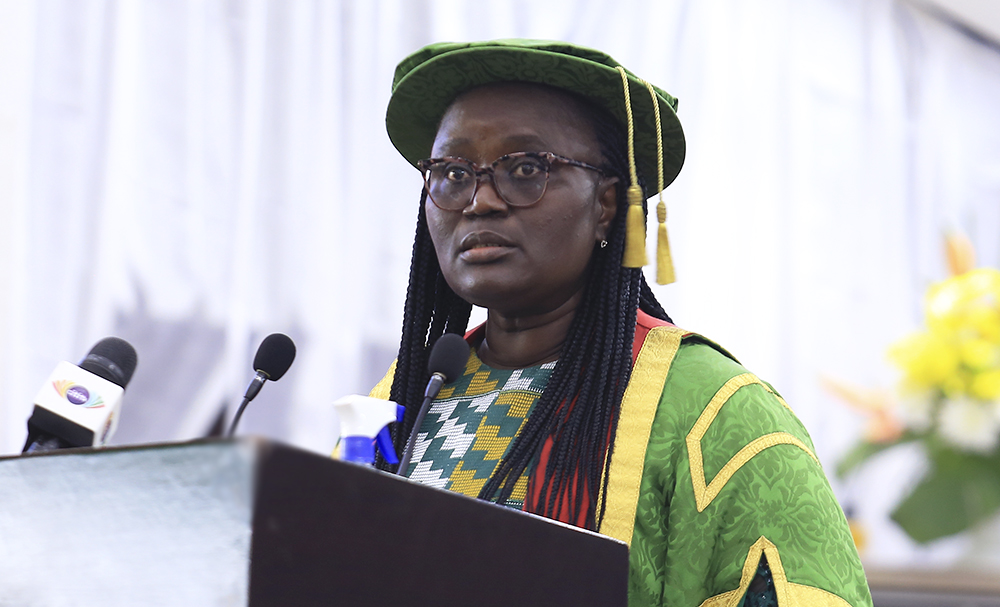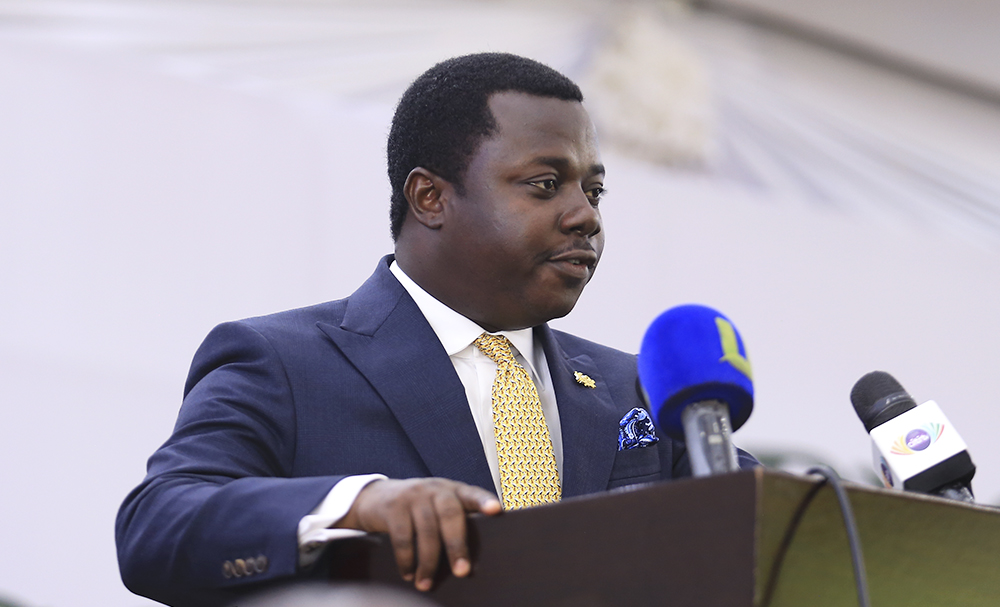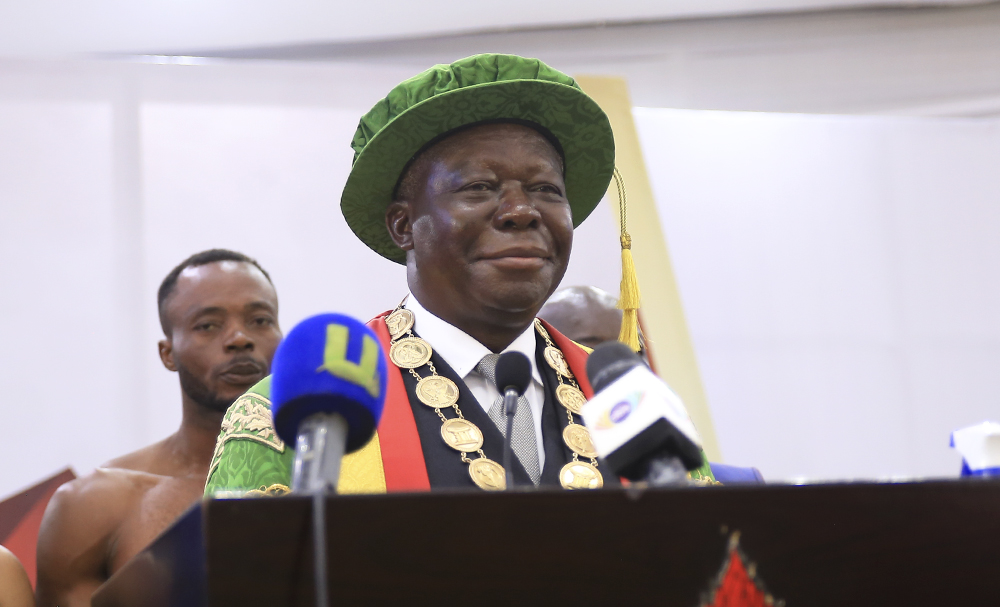The Chancellor of the Kwame Nkrumah University of Science and Technology (KNUST), His Royal Majesty Otumfuo Osei Tutu II, has called on labour unions and the Government to dialogue in goodwill and trust which are essential ingredients in resolving conflicts.
He stressed this about the University Teachers Association of Ghana (UTAG) strike that lasted for almost two months leading to the disruption of academic work in all public universities across the country. He, however, lauded the Government and the UTAG for amicably resolving the impasse and restoring normalcy to the various campuses.
Speaking at the climax of the 2021 Special Congregation ceremony of KNUST held at the Great Hall, the Asantehene again appreciated the efforts of the Government for the asphalt overlays on 40 kilometers of roads on the University campus and its resolve to extend to the Obuasi campus and the other teaching facilities of the University.
His Majesty Otumfuo Osei Tutu II revealed that the first phase of the University Hospital which had remained stalled due to financial constraints will be completed by October this year. He added that the Government is making the necessary provisions for the second phase of the project in this year’s Budget. The project, he explained, will not only provide health care services but will also serve as a teaching, research, and training facility for health and allied professionals required for efficient health service delivery in the country and beyond.
As the world is going through turbulent times with COVID-19 antecedence lurking in the background and the Russian- Ukraine war still raging, he urged the graduands to create a niche for themselves in the professional environment and pay critical attention to entrepreneurial skills to become leaders. ‘You must think outside the box. Most organisations are awash in creative ideas that never get executed. Graduates can capitalise on these opportunities by bringing them to fruition. In essence, your entrepreneurial skills will help you function as an entrepreneur.’

The Vice-Chancellor, Professor (Mrs.) Rita Akosua Dickson, reported that with the devastating nature of pandemics and the havoc they could cause to the world and humanity, KNUST has been selected as one of the sites in Africa to host the German-West African Centre for Global Health and Pandemic Prevention (G-WAC) through a collaboration with the Berlin School of Public Health and the Medical Faculty of the University of Bonn. The project, worth 2.7 million would help detect, respond, and prevent outbreaks of emerging and re-emerging infectious diseases in Africa.
In the same vein, about KNUST’s collaboration with ENI Ghana dubbed “OKUAFO PA” which seeks to train youth in Agribusiness Enterprise Development, KNUST has been able to train 1600 youth in secondary and tertiary education backgrounds. The beneficiary youth have been provided with knowledge and skills which have empowered them to establish their business enterprises along the agricultural value chain as well as being equipped with the capacity to employ others.
Professor Dickson applauded the staff and students who have won grants to embark on impactful projects. These include Prof. K.B. Nyarko of the Department of Civil Engineering, Prof. Fred Stephen Sarfo of the Department of Medicine, Prof. Michael Poku-Boansi, Deputy Director, School of Graduate Studies; Prof. Nathaniel Boso, Dean, KNUST School of Business; Dr. Samuel Asamoah Sakyi of the Department of Molecular Medicine.
She also acknowledged Prof. (Mrs.) Cynthia Amaning Danquah, Prof. George M. Bob-Milliar, Prof. Marian Asantewah Nkansah, Mr. Mathias Charles Yabe, a final year student in the Department of Communication Design, Dr. Kofi Agyekum, and Prof. Marian Asantewah Nkansah for winning different laurels and recognition.

The Deputy Minister for Education, Rev. John Ntim Fordjour, thanked the Chancellor under whose leadership, KNUST is far rising as a global giant. KNUST being ranked the best University in Africa in terms of Quality Education, he emphasised that the University has become the 'MIT' in Africa. He, therefore, commended the management of the University and all other stakeholders whose collective contributions have made KNUST what it is now.
He intimated that the government is working assiduously to leverage technology to ensure that everyone gets access to education irrespective of their location. He was highly optimistic that KNUST would lead the charge and play the frontline role to imbibe in students creativity and innovation. He, thus, implored the University to ensure to train the students with the emerging trends of digitalization.
The Deputy Minister revealed that according to the World Economic Forum, in the next 20 to 30 years, 65% of jobs will be automated and workforce replaced by artificial intelligence, augmented reality, and robotics. ‘This is a matter of urgency that we prepare learners that are not only matched for the dictates of the industry skills today but the competitive market tomorrow.’

In all, KNUST graduated a total of four thousand, seven hundred and twelve (4,712) students made up of one thousand four hundred and fifty-five (1,455) undergraduates and three thousand, two hundred and fifty-seven (3,257) postgraduates. In terms of gender, the University graduated Thousand, six hundred and fifty-two (1,652) females representing 35.06% and Three thousand and sixty (3,060) males representing 64.94%. 69 graduands among the postgraduates received Ph.D. awards.

















